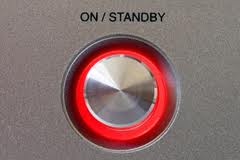
Welcome
David Burns is an environmental chemist with expertise in laboratory data audits, green chemistry, and industrial ecology. David is available to help business & professionals integrate sustainable supply chains and energy efficiency into service offerings. The following blog topics are intended to invoke awareness and/ or action in Going-Green. You are also invited to create a Free Whoisgreen business profile using the link above. David Burns is a NSC member of the Rocky Mountain Institute.

New & Retrofit: A master GREEN and AWAY switch combination near your kitchen will reduce household electricity bills by up to 50%. Read more ...
No one likes paying more for power. A master GREEN and AWAY switch combination turns off all but essential power and makes it easy to reduce bills. A master GREEN and AWAY switch maintains power to the alarm, refrigerator, Foxtel, lights, and other essential devices such as smoke detectors. Switching off power at night and when away improves consumption, making your home efficient and is expected to increase real estate valuations. Until now, most homes have not bothered to save energy in the same manner that commercial buildings do.
According to Tyron Butson (Manly Daily 23 April 2011), ‘Families Being Left in the Dark', claimed that increasing power prices were attributed to big retail companies and governments bungling power delivery. Although believable, the root cause is the cost to maintain supply with our insatiable appetite for power in an environment where 90% of electricity is wasted as heat, friction, and over-engineering by the time it is converted into transportation, cooked food, entertainment, and services. This shocking statistic increases to 95% if products ending up in landfills within 6 moths of purchase are considered as waste.
An efficient home with a master Green and Away switch combination can expect to save an additional 10-20%, compared to a typical home saving up to 50% (time-of-use tariff). Your local electrician can wire in a master Green and AWAY switch combination. Remember not to include the auto-garage door on the AWAY circuit if you want it to work when you leave and return home.
Additional energy savings include using delay start and timers on appliances and pool pumps to push consumption into off-peak tariffs (10pm - 7am). Turning things OFF is the only way to save.
Don't pay too much for your power. Make Your Home Energy Cheap with a master Green and AWAY switch combination.
David Burns is a Sustainability Advisor and Analyst, www.sustain450.com.au
If you have a friend that you would like to share this with, then










The simplicity of an eco-switch connected directly to a home or small commercial building electrical meter box is that you don't need to buy an expansive EMS or BMS to save money by eliminating waste. In addition, you only need a $150 'Centameter' or equivalent to monitor efficient consumption to compare monthly consumption to a benchmark kWh target. A manual eco-switch is mechanically activated and not reliant on software and hardware problems, and simple to use - you just switch it on, and switch it off or use the programmable timer.
This would equally be fantastic for small business owners to control energy costs when closed and during shifts. Let me know when it is available.
If the little red light indicating standby power was accompanied on the front panel of an appliance with accumulated $'s ticking over, we would be reminded to turn off things to avoid wasting money.
Great idea, smart and simple.
This is a great innovation, David. There have been numeropus products coming onto the market of alte to address thsi issue such as remote controlled powerboards and remote switches such as the Ecoswitch but none are as comprehensive as this. The trick will be to make sure all the 'essential' loads are identified - some may be overlooked such as the pump for a solar hot water heater so that the water in the panels is circulated when hot. I know it is expecting a lot but having several modes would be good such as an overnight or weekend mode and a longer term vacation mode. However the real problem is that we have too many appliances and automated equipment. Graham
Good read David. Staying ahead in the fast-changine sustainability game as usual.
A discrete power board with master standby switch is great for appliances and entertainment systems in individual rooms. However, during an audit of a typical home, I found the following extra non-essential loads that a power board system will miss - 1. pool pump, 2. automated irrigation system (on timer), 3. washing machine & clothes dryer (ppt's turned ON behind appliances - actuator consumes power even when machine on/off buttons turned OFF), 4. microwave oven (actuators on even when front panel switch OFF), 5. auto-garage door motor, 6. Rheni instant gas hot water service, 7. digital telephone system, 8. wireless internet, 9. coffee machine, 10. powered awnings, 11. greywater treatment system, 12. garden pond pump, 13. built-in kitchen steamer, 14. built-in kitchen plate warmer shelf, 15. cinema room projector (ppt in ceiling), and 16. gas boiler for hydronic floor heating. The majority of these are left on 24/7, but only used for a fracion of the time. Therefore an easy solution is needed to capture these types of stdby power loads to reduce bills and consumption. The model most likely to be successful is the same one commercial building managers use where they separate the electrical reticulation design (single line diagram) into 'Essential' and 'House Power' (note sub-tenant power is not appliable to residential homes).
David, I like this idea - for the 4 weeks annual holidays when many leave their standby appliances on, this should easily reduce power by 10% in any household. This can also be achieved to a large extent with powerboards with one master off switch, and these can be managed one room at a time as they are vacated eg. study, lounge. But I guess more effort is needed with these to ensure they stay off unless someone is using them. I found the trickiest part is to get everyone to agree on when to switch things off - the behaviour side of things. John